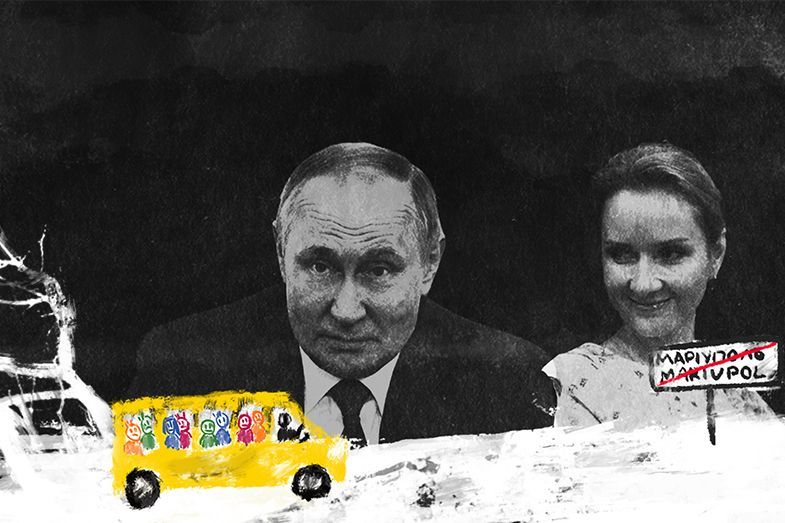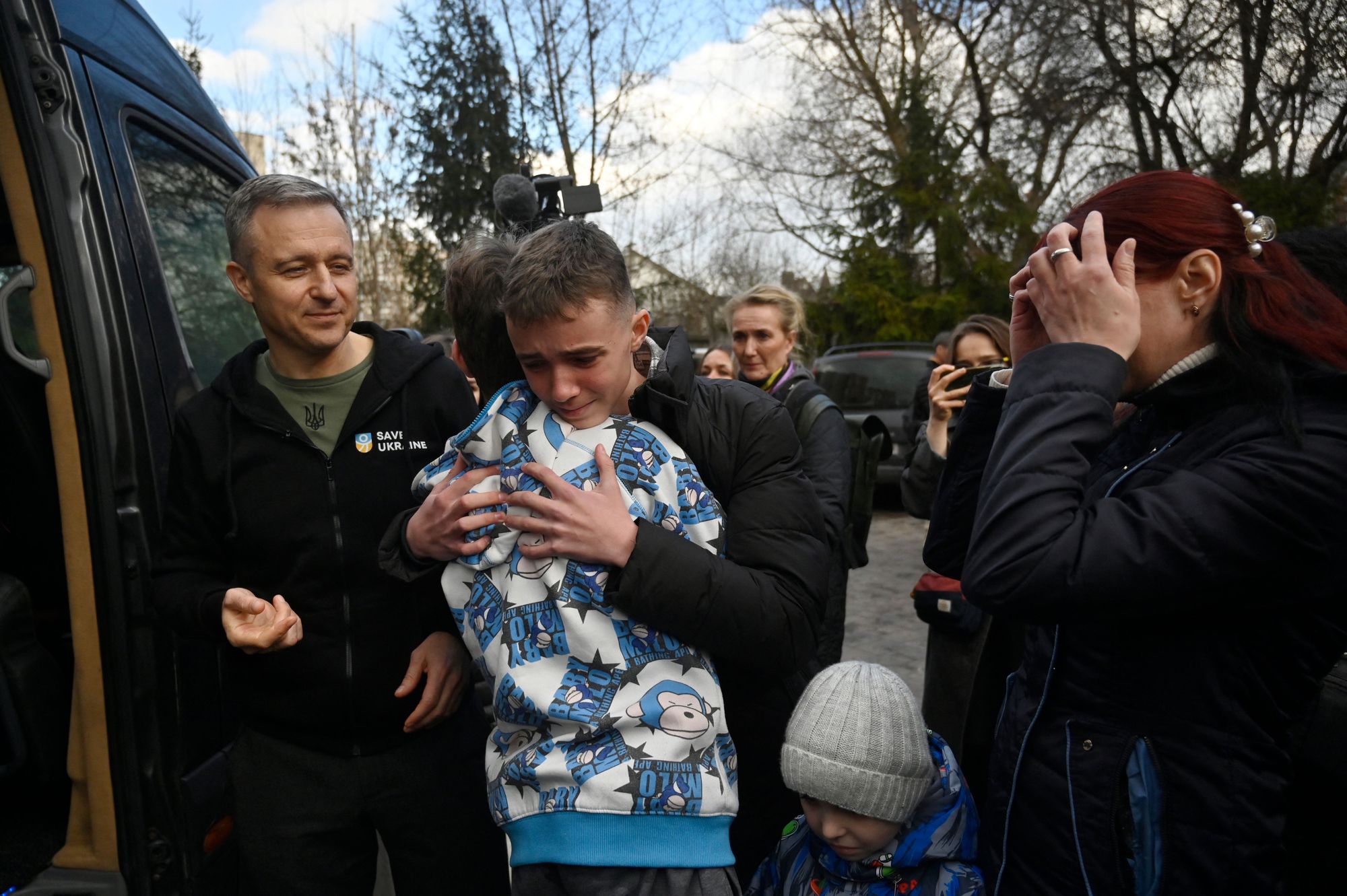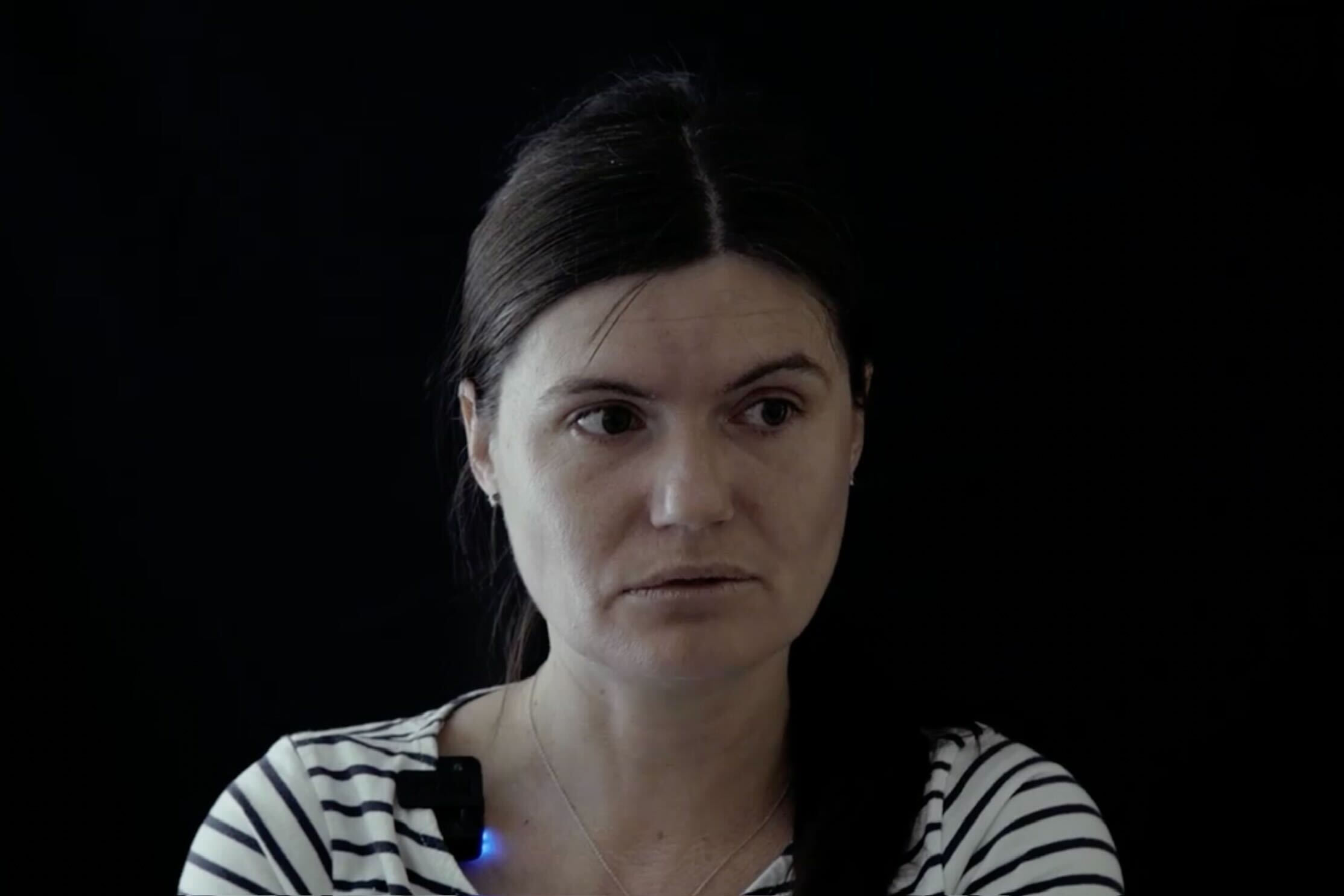Abducting the future: How Ukrainian parents fight to rescue their children from Russia

One thought helped Yevhen Mezhevyi overcome the ordeal of Russian captivity – the thought of his three young children.
Single father Mezhevyi, 40, was captured by Russian troops at a checkpoint when he and his children were fleeing their war-torn hometown of Mariupol last spring.
For 45 days, Mezhevyi was kept at the notorious Olenivka prison camp in the Russian-occupied part of Ukraine’s Donetsk Oblast. There, he endured beatings, was forced to do hard labor, was deprived of food and sleep, and was locked up in a tiny dilapidated cell with dozens of other Ukrainians.
And for all of that month-and-a-half, Mezhevyi had no idea where his children were.
"I communicated with them in my thoughts. I had nothing else left," Mezhevyi told the Kyiv Independent.
But the torment Russia had inflicted on Mezhevyi did not end on his release from captivity in late May – it had only just begun, as shortly after he was freed he learned that the Russians had abducted his children.
"Your children flew to Moscow today," Mezhevyi was told at a Russian-controlled police department in the occupied city of Donetsk.
"They went to a camp there."
But this was no holiday: Mezhevyi’s children had become victims of one of the most appalling consequences of Russia’s full-scale war against Ukraine – the forced deportation of Ukrainian children to Russia.
Since last February, nearly 20,000 Ukrainian children have been identified as abducted from Russian-occupied territories and sent to other Russian-controlled areas of Ukraine, or to Russia itself, according to a Ukrainian national database on child abductees. Russia is quite literally abducting Ukraine’s future.
Russia often separates children from their parents at checkpoints, or at its sinister filtration camps, where it attempts to discover the true loyalties of Ukrainian citizens.
Sending the children to "recreational camps" in Russia or in territories under its control is just one of the ways Russia carries out the unlawful deportation of Ukrainian children.
The Ukrainian authorities and charities involved in returning these children say that their mission is exceptionally challenging. The figures prove that: As of Sept. 20, Ukraine had returned only 386 of the abducted children.
Mezhevyi’s children are some of the lucky ones.
According to an investigation by Radio Free Europe/Radio Liberty, Mezhevyi and his children are now “key witnesses” in the International Criminal Court’s case against Russian President Vladimir Putin and Russian Presidential Commissioner for Children's Rights, Maria Lvova-Belova.
In March, the ICC issued arrest warrants for Lvova-Belova and Putin for overseeing the forced deportation of Ukrainian children to Russia – an alleged war crime and act of genocide.
Five days to rescue
For the first two months of Russia's all-out war, Mezhevyi struggled just to keep himself and his three children – Matvii, 13, Sviatoslava, 10, and Oleksandra, 7 – alive in the heavily bombed city of Mariupol, which was then being besieged by Russian troops.
They spent weeks in the bomb shelter of a local hospital, with dozens of other residents.
"We would all gather together in the evenings, singing, playing cards, and telling stories…" Mezhevyi recalled.
But one day in early April, Russian troops disrupted the “routine” they had established.
"They came and said: 'You have half an hour to collect your belongings, because a Chechen unit is coming, and there will be a 'sweep,'" the Russian troops said.
Like many, Mezhevyi's family followed the order and were soon taken to a Russian checkpoint in the nearby village of Vynohradne, on the eastern outskirts of the city.
"You’re one of our clients," a Russian soldier told Mezhevyi after seeing his registration at a military unit in Ukraine's western Lviv Oblast. Mezhevyi served there under contract as a mechanic from 2016 to 2019.
Russian soldiers told Mezhevyi he needed to find someone to stay with the kids while he had to go to some place to "provide an explanation."

When asked how long it would take, the Russian troops told Mezhevyi it could take "two hours or seven years." They were not joking, he said.
And so his ordeal of Russian captivity began.
Mezhevyi endured several interrogations at detention facilities across occupied Donetsk Oblast before being taken to his final destination – the Olenivka prison camp.
He said detainees are heavily beaten on their arrival at the prison. Over 50 prisoners, including Mezhevyi, were held in a cell designed for six. Soon, 29 of them were transferred to one made for just two people.
"It was beyond horrible," he said, adding that it was hardly possible even to stand.
"I saw people becoming insane and start hurting themselves there."
Mezhevyi’s "mental connection" with his kids and thoughts about them helped him stay sane and survive the nightmare, he said.
While he was in captivity, his children were first kept at a filtration camp in the village of Bezimenne, about 30 kilometers east of Mariupol, on the Azov Sea coast. Then they were taken to a hospital in Russian-occupied Novoazovsk, another 10 kilometers to the east. Mezhevyi said that after that they spent a day at an orphanage in Donetsk, after which they were taken to the Russian city of Rostov-on-Don. Then they were put on a plane to Moscow.
Only on his release from captivity did Mezhevyi learn that his children had ended up at the "Polyana" camp in Moscow Oblast, nearly 1,000 kilometers from their home in Mariupol.
After a frantic search, he found the phone number of the person overseeing his children at the camp. He calmed down a little after hearing their voices on the other end of the line.
According to Mezhevyi, Lvova-Belova had visited the camp herself. As Russian officials often do, she brought gifts and some fast food to the children there, trying to "bribe" them, Mezhevyi said.
"When you give (fast food) to children brought from a war zone, they will be happy. So they were trying to show how (bad) Ukraine was and how awesome Russia was," said Mezhevyi.
Since Mezhevyi had no money for the expensive trip to Russia to rescue his children, he decided to stay at a friend's and get a job to save up for the journey. But his plans were cut short one day in mid-June when his oldest, Matvii, called.
Russian social workers had told the kids that since their time at the camp was ending and they could not be returned to Donetsk Oblast due to the fighting there, they would be taken to an orphanage or to a foster family in Russia.
"(Matvii) told me I had five days to rescue them," Mezhevyi said.
So he had to act fast. Although he still didn’t have enough money, Mezhevyi found some Russian volunteers who agreed to help, and who paid for the trip.
Ukrainian volunteers usually help return children from Russian captivity. They say that such rescue missions are difficult and do not disclose their details.
The camp, he said, looked more like a "custodial facility" than a recreational site for children, with "big fences everywhere, serious security, and an electronic access system."
He was questioned there and had to write out numerous declarations before he was allowed to see his children.
"While I was filling out another declaration, I heard my girls' voices. I dropped everything and ran to them. We hugged and kissed, and then Matvii joined us," he recalled.
Reunited, they escaped Russia and found a new home in the Latvian capital, Riga. They do not plan to return to Ukraine until the war is over.
Russia has already brought too much pain to Mezhevyi's family, and they don't want to experience such a nightmare ever again, they said.
A child made a hostage
Almost all of Olha Usyk’s family gathered at the train station in Balakliia, Kharkiv Oblast, on March 26 this year.
Someone very dear to them was on the train arriving from Kyiv. Someone Usyk wanted to see so badly that tears started to run down her face as soon as she saw the train approaching the station.
Usyk knew that just in a few minutes, she would hug her 14-year-old son Bohdan for the first time in seven months.
"He got out (of the train), looking a lot thinner and taller, more mature," Usyk says. "He had changed a lot," she adds. "I barely recognized him."
The previous summer, her son had been taken to a recreational camp in the remote Russian city of Gelendzhik, in the south of Russia, on the Black Sea coast. At that time Balakliia – a town in southeastern Kharkiv Oblast with a pre-war population of nearly 27,000 – had yet to be liberated by Ukrainian forces.

Usyk says the Russian occupation hit the people of Balakliia hard: There were torture chambers where at least 40 people were held captive at the same time, according to the police. Usyk says that Russian attacks targeted the city constantly, and intensified in summer.
"We planted vegetables amid the shelling," she recalls.
While her youngest five-year-old daughter did not understand what was happening and remained relatively calm, her oldest, Bohdan, was under severe stress.
"He stopped sleeping and didn't eat much. At night, when there were explosions, he would jump out of bed and run about aimlessly," Usyk says. "He was beyond scared."
Seeing that some of her fellow citizens had agreed to send their children to Russian camps and recreational facilities, she also thought this might be the right thing for Bohdan.
Little did she know that her desire to save and protect Bohdan from witnessing the attacks would turn into another nightmare – for both of them.
"I thought that (for Russia) children would not be a bargaining chip, and that they would return him," Usyk says.
Usyk says Bohdan was among the 25 kids deported from Balakliia to the “Medvezhonok” camp in Russia’s Krasnodar Krai region in late August. She also says Russians promised to return them after 21 days.
They did not keep their promise.
Instead, Bohdan was kept in Russia for about seven months.
After Ukraine regained control over Balakliia in September and 21 days had passed, Usyk reached out to the person overseeing Ukrainian children in the Russian-controlled camp.
In response, the person told her "there had been no orders to return the children" and that parents could either try to go to Russia themselves or "wait until Russian troops return to Kharkiv Oblast."
Usyk knew her son wanted to return home badly, but she didn't have enough savings for the trip to bring him home.
Bohdan was held in a number of facilities across Russia’s southwestern Krasnodar Krai region during the time he was in the country: From the camp in Gelendzhik, he was transferred to one in Anapa, further to the northwest on the Black Sea Coast, and then to the city of Yeysk, on the Azov Sea coast, where he stayed until March. After that, he was taken to Voronezh in central Russia.
Usyk says her son was lucky not to be "brainwashed with Russian propaganda messages" in the camps. She assumes that was because he was taken care of there by some Ukrainians.
Unlike other children she had heard of, she says Bohdan wasn't punished or threatened there.
According to Usyk, the Russian local authorities often visited the deported Ukrainian children, bringing them gifts, including smartphones and clothes.
Usyk says she also heard that three Ukrainian orphans from Kharkiv Oblast had been adopted by families in the Chechen Republic.
Although they had communicated often, and she knew where her son was and how he was doing, she was heartbroken every time she heard his voice – she could hear how badly Bohdan wanted to come home, and how he missed her and his loved ones.
By February, Usyk had saved enough money for the trip to Russia. She traveled hundreds of kilometers to the Russian border, only to hear that she was not allowed to enter the country.
"I was crying hysterically there, but they just kicked me out," she says.
Bohdan was devastated and speechless when he found out his mother could not make it: "He couldn't talk and called me only the next day," Usyk says.
"It was very hard."
But eventually a way to bring Bohdan home was found. The Ukrainian "SOS Children's Villages" charity, which works with the Ministry for the Reintegration of Occupied Territories to bring back deported Ukrainian children, put Usyk in contact with another woman whose child had also been abducted by the Russians.
She managed to get all the paperwork done so that this woman could bring Bohdan home from Russia instead of her.
Finally, in late March, Bohdan was brought home.
Usyk describes the months she spent without her son as the toughest in her life. She missed Bohdan a lot, and he missed her too.
"I was cursing myself for that… No one thought that (the children) wouldn't be returned (by the Russians). I didn't think children would be made hostages in this situation," Usyk says.
"It shouldn't be like that."
"As we can see now, Russia follows no laws."
Note from the author:
Hi! Daria Shulzhenko here. I wrote this piece for you. Since the first day of Russia's all-out war, I have been working almost non-stop to tell the stories of those affected by Russia’s brutal aggression. By telling all those painful stories, we are helping to keep the world informed about the reality of Russia’s war against Ukraine. By becoming the Kyiv Independent's member, you can help us continue telling the world the truth about this war.














